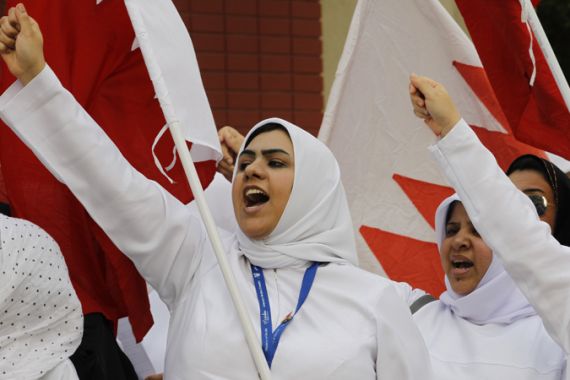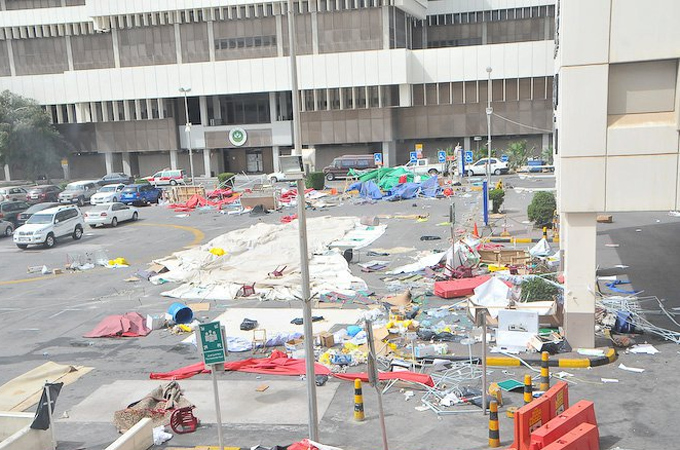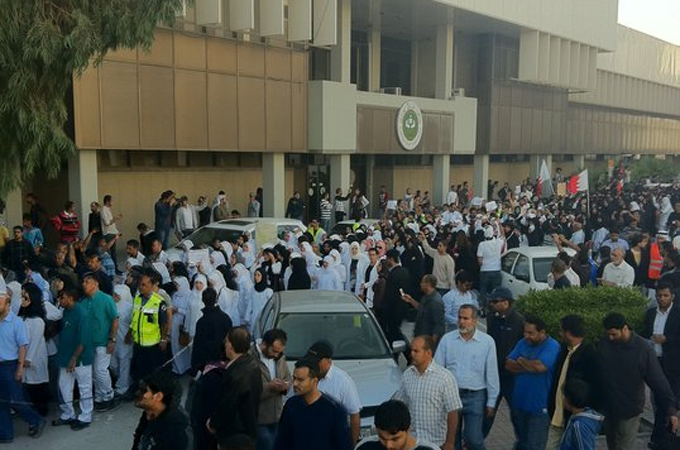Bahrain’s hospital of ghosts
Bahrainis with protest-related injuries are reportedly being kept away from family in a hospital guarded by soldiers.

 |
| Aftermath of demonstrations outside Salmaniya hospital after security forces attacked medical staff [Shenaz Kermali] |
Salmaniya Medical Complex, once one of the most renowned medical facilities in the Gulf and a jewel in the crown of Bahrain’s public healthcare system, has been transformed into a virtual ghost town.
Its gates and front entrance are barricaded with checkpoints and masked military officers, armed with rifles. Its emergency room, once the busiest in the country, is empty.
Keep reading
list of 4 itemsAmid global polarisation, the pandemic agreement encourages cooperation
Sunak apologises after report finds UK government covered up blood scandal
Philippines plans vaccination drive as whooping cough outbreak claims lives
And, according to eyewitness reports collected by Human Rights Watch, hospital staff say security and military forces have sought out and threatened, beaten and detained patients with protest-related injuries.
These patients are then systematically segregated from the rest of the patient population and transferred to the sixth floor, where they are virtually inaccessible to anyone, including family.
“There are more military officers in the hospital than patients,” says Faraz Sanei, a Human Rights Watch observer who has recently been inside Salmaniya. “It is not a normal environment or safe haven for patients. Patients and staff have told us there’s a security lockdown and doctors from there are very frightened to speak.
“The fact that it’s empty means there’s not much of an inflow of patients going in. People don’t want to go there because they’re afraid,” he adds.
Saeed, a member of a Bahraini political society, has taken more than 100 patients with protest-related injuries to hospital and says that government intervention in hospitals was previously unheard of.
“Salmaniya has been besieged by the army,” he says. “When we take patients, and if they have a bullet or pellet in their body, they put them directly in emergency and operate. After the operation the patient is taken to the sixth floor. No one is allowed to come see them. Even the hospital employees on the sixth floor – the doctors, the nurses and the people bringing food from the kitchen – have been replaced with military staff.”
Frontline
Close to Pearl Roundabout, the focal point of the opposition protests, Salmaniya hospital has been on the frontlines of what started out as a peaceful pro-democracy demonstration.
Inspired by the political movements in Egypt and Tunisia, Bahrain’s opposition movement has been calling for constitutional change and an end to systematic discrimination against the majority Shia population.
The ruling Sunni al-Khalifa family acted quickly to suppress the demonstrations; security forces opened fire on the protesters on February 16, killing at least three people and wounding dozens more.
But the protests continued. One month later, when the Gulf Cooperation Council (GCC) issued a mandate to bring in 1,000 Saudi-led troops, the government wasted no time in clearing out Pearl Roundabout. Hundreds were wounded in the ensuing chaos as riot police fired on protesters with teargas, rubber bullets, birdshot pellets and live ammunition.
Angered by the presence of doctors and paramedics on the scene, security forces reportedly turned on the medical community; reports surfaced of doctors being attacked by riot police while tending to the injured and of ambulances being blocked from entering hospitals.
“When the demonstrators at Pearl Roundabout were attacked, people were outraged all over Bahrain,” says Sanei. “Doctors were outraged and openly criticised the ministry of health for not having a plan in place.”
‘They took him to the sixth floor’
 |
| Salmaniya hospital on the frontlines of protests in Bahrain [Shenaz Kermalli] |
But while the opposition protests have now quelled, Sanei says security sweeps in Shia villages have not. “They’ve become a daily occurrence. It’s not clear what the reason is … were they protesting? Did they write something on Twitter? Whether people are outside chanting [anti-government] slogans or not they could be caught in [the] crossfire. There’s no accountability whatsoever.”
According to eyewitness reports, patients with protest-related injuries have also been removed from private or local public hospitals and forcibly transferred to Salmaniya or to the Bahraini Royal Medical Service, a hospital exclusively for army personnel, the royal family and government employees.
In one case, a 21-year-old student who was shot with a pellet gun at close range on March 25, was treated at home for three days before his family called for an ambulance to take him to Salmaniya. More than 100 pellets had been fired into his chest and kidney.
The victim’s brother, Ahmad*, said he and his friend had been walking to the village convenience store when they were targeted by two military officers.
“They were not protesting but there was some peaceful protest activity going on in our village,” Ahmad said. “In the situation right now though, everyone will be targeted, even women. Police think that whoever they shoot is a protestor – they don’t see the difference.”
The victim’s family tried everything possible to avoid sending him to hospital. His sister had recently completed nursing training and attempted to treat him from home.
“I tried to stop the bleeding and the pain for three days,” she said. “We were afraid to take him to Salmaniya. We also took him to almost all of the private and international hospitals in Bahrain. They brought him into emergency and took x-rays but said he needed ICU treatment.
“As a last choice we took him to Salmaniya. It looked almost empty in emergency … and there were more military officers around than patients. They were all walking around with their guns inside and outside the hospital.
“We saw him being taken after to ward 63 on the sixth floor. They told us to leave then and that we were not allowed to visit him. We have not heard any more information on him after that.”
Bahraini government officials dismiss claims that the hospital has become a place to fear.
“The people are relieved that the army has freed the hospital,” says Adel al-Moawda, the chairman of Bahrain’s parliamentary foreign affairs, defence and national security committee, adding: “The army is there to keep the terrorists out.”
He says the injured protesters were transfered to Salmaniya because they could not afford to pay for private medical care. All other claims, he adds, are “very big lies”.
“People are going in and out freely now,” he says. “I don’t know what’s happening on the sixth floor of [the] hospital.”
An opposition hub
But even before the army took over Salmaniya, the hospital had lost its neutrality as a public space. In the weeks preceding the attack on Pearl Roundabout, it had become a key site for the opposition, who would disseminate information there on the weapons the police and military were using against protesters.
Journalists and international NGOs flocked to the medical complex where they could easily access the building and verify the number of dead and wounded with medical staff.
The atmosphere had become highly politicised. “Tents were set out and pictures of martyrs were put up,” says Sanei. “Tables with rubber bullets and canisters were laid out for everyone to see the force the government was using against the people. Anti-government slogans were put up in the parking lot and people were sleeping there. It was a chaotic place.”
“It was the only place where all the journalists could find information,” says Nabeel Rajab, the president of the Bahrain Center for Human Rights. “The government didn’t want this information to get out … that’s why they’ve occupied the hospital with the military.”
Government officials claimed the opposition movement was taking over the hospital and stockpiling weapons – an accusation vehemently denied by activists.
Omar Said al-Hassan, an analyst with the Gulf Center for Strategic Studies, agrees with the government’s assertion that the hospital needed protection. “The government had to go [to Salmaniya] to evacuate the opposition. Some people are just trying to make life impossible … fortunately the government has managed to get rid of them.
“The government has tried to enforce the law and put life back to normal … it’s much better now,” he added.
“The fact that the place lost its neutrality, where journalists went to get that kind of information and the doctors became very critical, did make this a non-neutral site. That has to be acknowledged,” Sanei says.
“You don’t want hospitals to be a politicised place. The medical community in general in the early days was at the frontline of having to deal with the aftermath [of the attack on Pearl Roundabout]. They saw it happen so it’s natural there was an uproar.”